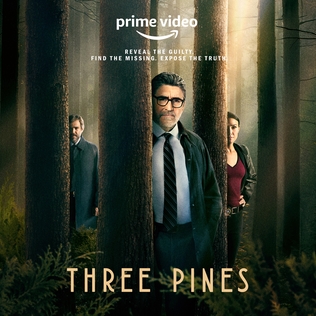This
may be a commonplace, but I’ve been thinking about what makes TV adaptions of
mystery series work, and while casting is clearly the biggest piece, there are
a whole lot of other pre- and post-production decisions in play.
Looking
back at the success of Magnum or
Michael
Connelly has two series running, with one in the pipe, and Ann Cleeves has three. This is no accident. The books give good weight. Connelly also gets exec producer credit on Bosch and The Lincoln Lawyer, and his sensibility looms
large. The other thing you notice,
though, is the depth of the cast, in both shows, and the feel. Bosch is very
Three Pines is
adapted from Louise Penny’s Inspector Gamache novels, and so far, Amazon has
aired two episodes. The
runtime is about an hour and forty minutes, which allows for development, and
breathing room. The pace is measured,
and there’s a very strong sense of place.
It’s shot in the Eastern Townships of
Pursuant to the remarks above, the first reason to watch is the lead, Alfred Molina, as Gamache. Molina goes back to Prick Up Your Ears, with Gary Oldman, and would you believe Enchanted April, not to mention voice work on Rick and Morty and Robot Chicken, as well as Doc Ock in Spider-Man? One of my personal favorites is Close to the Enemy, from 2016. Okay, he’s not Quebecois, or even Canadian, but he convinces me, and a large number of the rest of the cast is Canadian, and/or Indigenous. (Tantoo Cardinal!) All the same, Molina is the one to watch. Gamache is grounded. He doesn’t have a drinking problem, and he’s not grieving for a lost love. He’s a still point in a turning world, and Molina gives him enormous gravity. He seems to experience other people, to absorb their pain or folly or hope, and see it whole. His empathy makes him, of course, a terrific investigator, but it makes him deeply human, as well.
As for the Indigenous presence, there’s a thread of sorrow, never far from the surface. The back story of Native children taken from their parents and their homes, denied their language and history, pushed to assimilate into a white, Christian culture, subject to physical and emotional abuse. A survival narrative.
Three Pines works within the conventions, the community of eccentrics, and rash outsiders, hidden currents, shared secrets, and the rest, but touches on them lightly, for the most part. The sorrows, however, remain.
